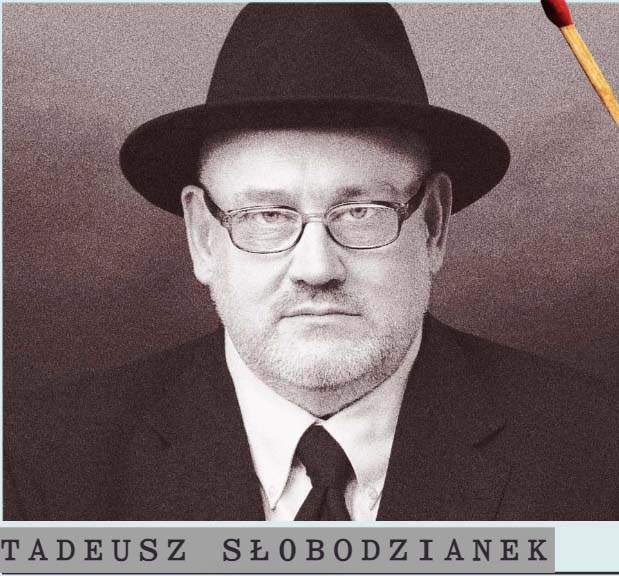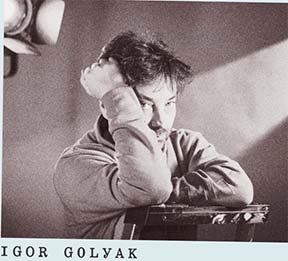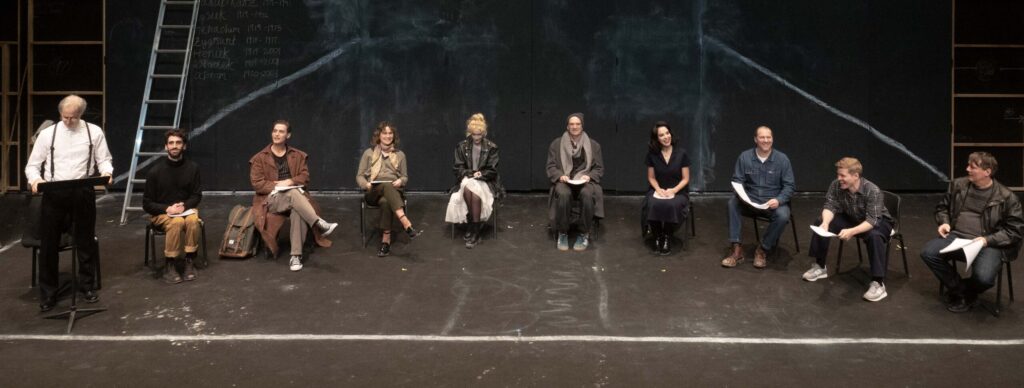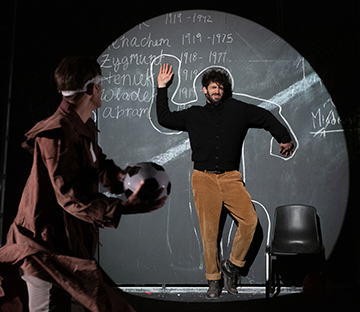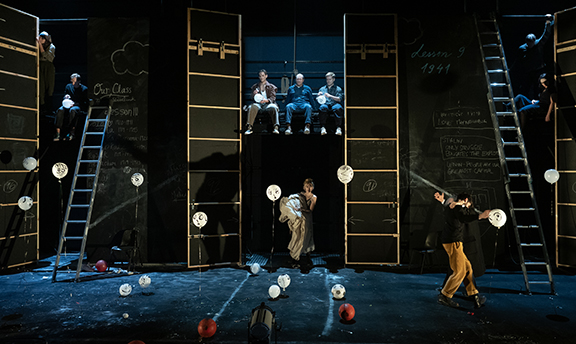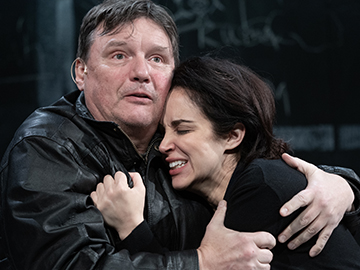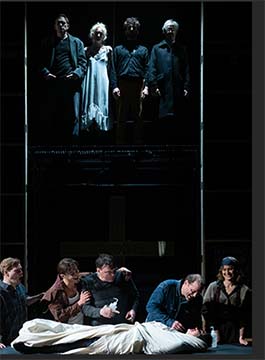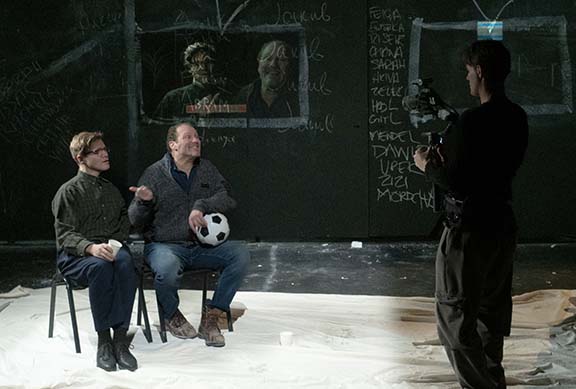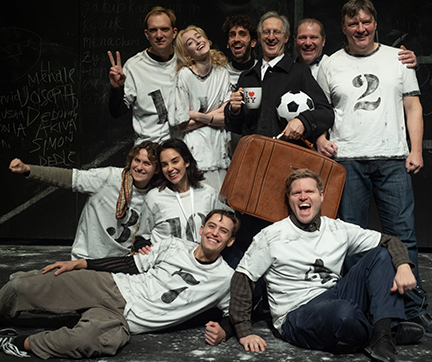By Lucy Komisar
“Our Class” by Tadeusz Słobodzianek, one of Poland’s most important playwrights, is a powerful and dramatic exploration of the impact of anti-Semitism and betrayal in a Polish village during and after World War II. It is based on a true story, a pogrom 80 years ago when 1600 Jews in a Polish village were murdered by their classmates, neighbors and friends. The story was told by the book “Neighbors” by Jan Gross. The playbill audiences receive has matchsticks imprinted on it.
Spanning the years 1939 and 2003, the play follows the intertwining lives of eight Jewish and Catholic characters as they struggle to survive the horrors of the Holocaust and then attempt to rebuild their lives in its aftermath. “Our Class” of course means Polish society.
The innovative director is Igor Golyak, from Ukraine, trained by the Russian Academy of Theatre Arts and Moscow’s Schukin Theatre Institute (Vakhtangov Theater).
With a mix of narrative and dialogue, the play relies on strong visual storytelling and a mixture of chillingly realistic scenes along with expressionistic elements to convey the trauma of the era.
It starts with the school children, Jews and Catholics, representing the Polish people.
The early scenes depicting the arrival of the Nazis and the beginning of the persecution of the Jews are harrowing, including the beating and murder of Jewish villagers. Some of the staging is surreal: a victim against a chalkboard outlined in white as the dead are outlined by police.
In this, I talk about Jews and Poles, though the Jews are also Poles and the “Poles” are Catholics.
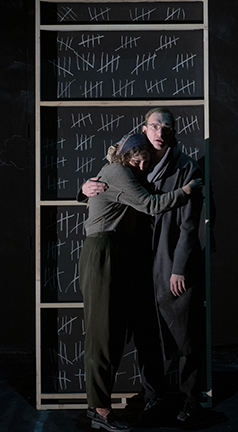
Tess Goldwyn as Zocha and Andrey Burkovskiy as Menachem, marks are days in hiding, photo Pavel Antonov.
Central characters include Jakub Katz (a moving, powerful Stephen Ochsner), a Jewish villager accused of being part of the Nazi resistance; Vladek (Ilia Volok, seeming dumb but understanding the realities), who tries to save his Jewish love Rachelka (Alexandra Silber, brilliantly transformed through the years); Zygmunt (Elan Zafir, the smarmy villain), a Polish collaborator and informer; Zocha (Tess Goldwyn) a Polish woman who hides Menachem (Andrey Burkovskiy, performed with panache by a prominent Russian actor who deserves his acclaim), a Jewish survivor who joins the Polish secret police after the war.
Their complex relationships and varying choices in response to the persecution around them form the core moral drama. Abram (Richard Topol) their teacher, leaves in time for America and is misled for years about how his family died in the village.
Events are visual and symbolic. Menachem has a new bike. The Catholics beat him and steal the bike. They return to their Christian prayers. Heniek (Will Manning, the guy you love to hate) carries a large wooden cross. Jakub asks, “Jesus is good with Władek throwing rocks at my sister and splitting her head open?” Vladek: “Someone had to shut her up. She was screaming like a banshee. (To Jakub) I was aiming for you.”
In Golyak’s inventive staging, Jewish figures are depicted as faces on yellow balloons which are cut loose from moorings to float away to signify deaths.
Zygmunt’s betrayal of fellow villagers to the Nazis is chilling, while Jakub’s steadfast refusal to confess to false accusations even under torture is moving and heroic. Vladek’s attempts to save Rachelka showcases the impossible choices faced by Jews trying to survive. Meanwhile Menachem’s turn to work for the Polish secret police after suffering torture himself highlights how trauma can twist moral reasoning.
The years are divided as “lessons.” Lesson 5, 1939, is Stalin. The Russian set up the Aurora move theater, which Menachem runs.
Rysiek (Jose Espinosa) a major Catholic betrayer and killer, yells, “Death to the Commie-Jew Conspiracy. Long live Poland!” Rysiek and other Poles start the White Eagle, resistance against the Russians, not the Germans. So, how do you feel when the Communist Russians abuse the Nazi Poles? Did they get what was coming to them?
The playbill lists the characters with birth and death dates. Only three die in 41 or 42, others in the 70s, 80s and later. Two were Jews, one was Rysiek, who got what he deserved at the hands of another Pole.
The play suggests that anti-Semitism and collaboration have poisoned this community for generations, ruining lives and souls, but mostly the Poles. As the characters age, their fates diverge but all are marked by the cruelties of the past. Heniek, now a priest, abuses altar boys. No surprise, always evil.
While unflinching in its depiction of moral corruption and violence, the play leaves room for redemption, as a few characters retain their humanity despite the horrors surrounding them.
With its theatricality, expressionism and epic moral sweep, “Our Class” brilliantly highlights questions of human nature, cruelty, resistance, and moral choice. And the courage of Polish playwright Tadeusz Słobodzianek to challenge the mythology of his country, who would blame the massacre of Jews on the Russians.
“Our Class.” Written by Tadeusz Słobodzianek, directed by Igor Golyak. Brooklyn Academy of Music, Fisher Fishman Space, 321 Ashland Pl, Brooklyn (around the corner from main BAM building). Tickets. Runtime 2hrs50min. Opened Jan 18, 2024, closes Feb 11, 2024. Review on NY Theatre Wire.


